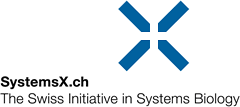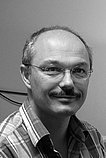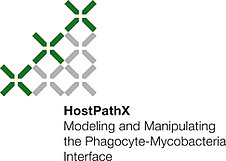HostPathX
Modelling and Manipulating the Phagocyte-Mycobacteria Interface
Tuberculosis is the most pervasive infectious disease worldwide, and recent emergence of drug-resistant strains emphasises the need for improved drug treatments. An integrated approach to dissect, model and ultimately manipulate the interactions between mycobacteria and their host is a promising innovative strategy to develop new anti-infective drugs.
Phagocytosis is an ancestral process, and efficient mechanisms of bacteria recognition, engulfment and killing are conserved from free-living amoebae to human macrophages. Intracellular pathogens such as Mycobacterium tuberculosis have evolved specific mechanisms to survive phagocytosis by re-programing phagocytic cells and have thus gained the capacity to replicate intracellularly.
A versatile and powerful host-pathogen model
Dictyostelium discoideum is an amoeba that feeds by phagocytosis and possesses a conserved cellular immunity. It is the target of bacterial pathogens such as Mycobacterium marinum, a widely accepted alternative model for tuberculosis. The genetically tractable D. discoideum – M. marinum infection model provides a powerful system to study mycobacterial pathogenicity. We have used this system in a phenotypic screen to identify anti-infective compounds inhibiting mycobacterial growth in infected cells. Now, we need to identify the mode of action of the compounds and to evaluate their potential as a lead for anti-tubercular drugs.
Innovative methods
We will mainly use dual RNA-sequencing to determine the transcriptional responses of the host and pathogen during infection, as well as the impact of the novel anti-infectives on both. Novel computational methods as well as state-of-the-art network analysis and modelling tools will allow us to predict putative modes of action. The hypotheses will be directly validated using appropriate genetic tools and biological assays.
| Principal Investigator | Prof. Thierry Soldati; Biochemistry Department, University of Geneva |
| Involved Institutions | University of Zurich, Technische Universität Darmstadt, University of Geneva, SIB Swiss Institute of Bioinformatics |
| Number of Research Groups | 5 |
| Project Duration | Mar. 2014 – Feb. 2018 |
| Approved SystemsX.ch Funds | CHF 3 million |
Mis à jour en juillet 2014


